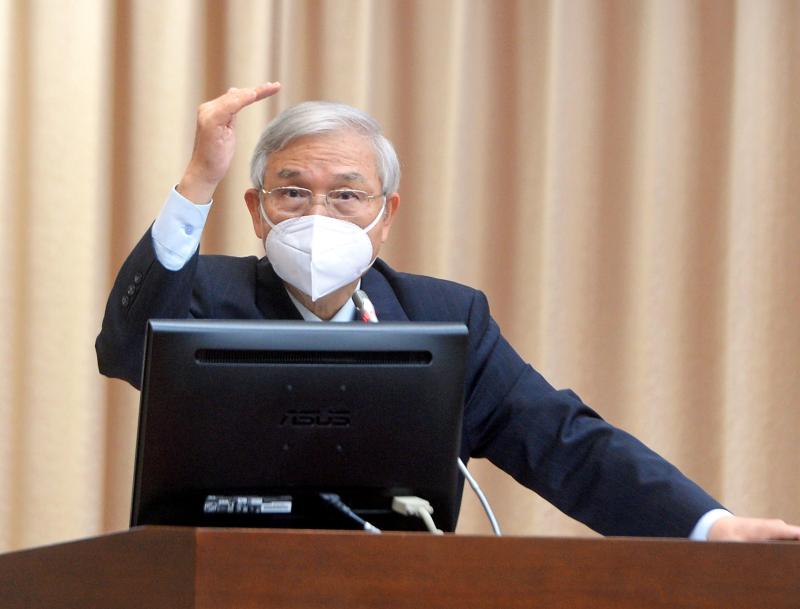The nation’s 4 percent GDP target this year might be difficult to attain, as Russia’s invasion of Ukraine and global monetary tightening is expected to weigh on exports in the second half, central bank Governor Yang Chin-long (楊金龍) said yesterday.
At a meeting of the legislature’s Finance Committee, Yang said that the central bank would revise its growth forecast at its board meeting next month.
The nation’s top monetary policymaker in March said the growth rate was expected to be 4.05 percent.

Photo: Wang Yi-sung, Taipei Times
“GDP growth of 4 percent this year looks increasingly untenable, as unfavorable factors would start to weigh in the second half, even though exports and consumption data have fared quite well thus far,” Yang said.
The war in Ukraine has been termed a “black swan” event — something that was unpredictable and had profound consequences on the global economy — while the rate hikes by the US Federal Reserve have been called a “gray rhino” event — a threat to markets that was predictable, yet largely ignored.
The military conflict in eastern Europe prompted major countries to impose sanctions on Russian oil and gas exports, which drove up international prices for fuel and raw materials.
Global central banks are hiking interest rates to help curb inflation, which is likely to slow economies down.
“The downside risks raise concern over whether growth momentum for Taiwan’s exports can extend into the second half,” Yang said.
Major chipmakers have given rosy earnings guidances for this quarter, while suppliers of laptops and other electronic devices expect declines due to COVID-19 lockdowns in China.
International research bodies have trimmed their forecasts for Taiwan’s GDP growth this year to 3.6 to 3.8 percent, Yang said.
Consumer prices in Taiwan remain high this month after being above 3 percent for the past two months, Yang said.
However, he refused to say unequivocally that the central bank would increase interest rates at next month’s meeting.
“The central bank has made known its stance leaning toward tightening and there are several policy options to achieve that end,” Yang said, citing interest rate hikes, selective credit controls and draining liquidity from the foreign exchange market, among other measures.
The central bank is mulling further selective credit controls, especially in areas with evident housing price hikes, to induce a soft landing, he said.
Policy tools under consideration include shortening mortgage periods and lowering loan-to-value ratios for second-home financing, he said, adding that the current policy only bans grace periods on second-home mortgages.
Shorter mortgage periods, from 20 to 30 years, would prompt borrowers to be more cautious in their financial planning, Yang said.

The CIA has a message for Chinese government officials worried about their place in Chinese President Xi Jinping’s (習近平) government: Come work with us. The agency released two Mandarin-language videos on social media on Thursday inviting disgruntled officials to contact the CIA. The recruitment videos posted on YouTube and X racked up more than 5 million views combined in their first day. The outreach comes as CIA Director John Ratcliffe has vowed to boost the agency’s use of intelligence from human sources and its focus on China, which has recently targeted US officials with its own espionage operations. The videos are “aimed at

STEADFAST FRIEND: The bills encourage increased Taiwan-US engagement and address China’s distortion of UN Resolution 2758 to isolate Taiwan internationally The Presidential Office yesterday thanked the US House of Representatives for unanimously passing two Taiwan-related bills highlighting its solid support for Taiwan’s democracy and global participation, and for deepening bilateral relations. One of the bills, the Taiwan Assurance Implementation Act, requires the US Department of State to periodically review its guidelines for engagement with Taiwan, and report to the US Congress on the guidelines and plans to lift self-imposed limitations on US-Taiwan engagement. The other bill is the Taiwan International Solidarity Act, which clarifies that UN Resolution 2758 does not address the issue of the representation of Taiwan or its people in

US Indo-Pacific Commander Admiral Samuel Paparo on Friday expressed concern over the rate at which China is diversifying its military exercises, the Financial Times (FT) reported on Saturday. “The rates of change on the depth and breadth of their exercises is the one non-linear effect that I’ve seen in the last year that wakes me up at night or keeps me up at night,” Paparo was quoted by FT as saying while attending the annual Sedona Forum at the McCain Institute in Arizona. Paparo also expressed concern over the speed with which China was expanding its military. While the US

SHIFT: Taiwan’s better-than-expected first-quarter GDP and signs of weakness in the US have driven global capital back to emerging markets, the central bank head said The central bank yesterday blamed market speculation for the steep rise in the local currency, and urged exporters and financial institutions to stay calm and stop panic sell-offs to avoid hurting their own profitability. The nation’s top monetary policymaker said that it would step in, if necessary, to maintain order and stability in the foreign exchange market. The remarks came as the NT dollar yesterday closed up NT$0.919 to NT$30.145 against the US dollar in Taipei trading, after rising as high as NT$29.59 in intraday trading. The local currency has surged 5.85 percent against the greenback over the past two sessions, central